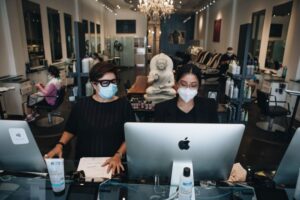To restart business, protect workers
States that are reopening their economies even as cases of COVID-19 are still rising are threatening their own residents and the whole country. But they are also running into two challenges that all states will face: Employees don’t want to return to work if they fear exposure to coronavirus on the job, and employers don’t want to get sued if their workers or customers end up sick. Both concerns are reasonable, and both could further cripple the economy unless Congress steps in.
It’s essential that companies take actions that protect their employees, yet they are getting little federal guidance in what exactly that means. Even those that take every conceivable precaution, however, will face unprecedented liability concerns that could paralyze investment and prevent them from rehiring workers they may have laid off or furloughed.
To protect employees, the federal government should outline exactly what safeguards companies should be taking at a minimum — and at the same time, offer a legal safe harbor to those that adopt and follow them.
We know that workplaces are potential hotbeds for coronavirus. By early April, more than 9,000 American health-care workers had already come down with COVID-19. At least 170 meat-processing plants had outbreaks as of Friday, infecting 11,500. Clerks and cashiers have been similarly hard hit. As the world returns to work, those numbers will surely worsen.
Meanwhile, hundreds of lawsuits related to the virus have already been filed, targeting schools, cruise lines, retailers and more. Class-action suits from customers or tort-law claims from workers could impose a heavy burden on companies at a time when they’re struggling to stay afloat — and when bankruptcy would mean even more job losses and even higher unemployment.
On a nationwide scale, these suits could impose a significant economic cost, create persistent uncertainty for businesses, impede needed investment and potentially cause production bottlenecks in industries that are essential to the country’s recovery. Congress must act, and soon.
Creating a safe-harbor arrangement that incentivizes employers to take specific steps will help ensure workplaces are safe. To qualify, companies could be required to provide employees with protective equipment – such as masks and gloves — and take other important precautions against infection, such as disinfecting workplaces, offering flexible sick-leave policies, and imposing social-distancing measures on workers and customers. Businesses that fail to follow the specified guidelines could still be held liable in court.
Both employees and businesses would benefit from this arrangement. Workers would have better protections, safer conditions and a legal recourse if their employer acted negligently. Companies acting in good faith could feel more confident opening their doors. And by adopting best practices and changing social norms for the better, they would help slow the spread of the virus.
Congress should also consider additional steps to help workers and businesses. For instance:
Lawmakers should establish a public fund for employees in critical industries, similar to the National Vaccine Injury Compensation Program, to help them if they get sick on the job. Congress should also consider a more expansive unemployment-insurance program for workers who are at especially high risk for coronavirus, and allow companies to offer tax-free bonuses — hazard pay — for those who need to be on site during the crisis.
With so many small businesses now in danger of closing, Congress should offer tax benefits or other relief to help them defray the costs of taking protective measures. It should also amend health-privacy laws that might prohibit employers from verifying if workers had been infected, assessing whether they’re at elevated risk on the job, or tracing their contacts within the workplace. Those laws, though well-intentioned, are now potentially quite dangerous.
Until a vaccine is discovered, produced and available to all, these kinds of common sense measures will be necessary to protect American workers — and to help American businesses survive, hire employees and get our economy moving again.

